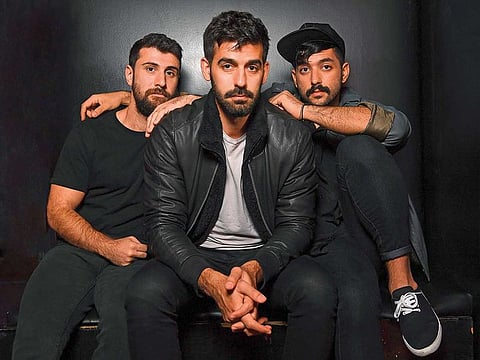Lebanon’s blasphemy wars strike popular rock band
Campaign by Christian activists forces Byblos festival to scrap Mashrou’ Leila concert

Beirut: When Egypt and Jordan banned the Lebanese indie rock band Mashrou’ Leila a few years ago because of its openly gay frontman and its progressive lyrics addressing social and sexual taboos, many Lebanese declared that this would never happen in their country.
A religiously diverse nation, Lebanon has long been a haven for artists and writers from the region, even more so as oppressive regimes continue to clamp down on freedom of expression in the wake of the Arab uprisings.
But last week, after a 10-day campaign by Christian activists against Mashrou’ Leila, including blasphemy accusations, online bullying and death threats against its four members, the Byblos International Festival, a major local music event, scrapped a planned concert by the band.
Festival organizers said the decision was to “prevent bloodshed and maintain peace and stability.”
Locally, the announcement was greeted with outrage and disbelief.
Mashrou’ Leila has played many times at various venues in Lebanon and appeared twice at the seaside Byblos festival.
Yet the controversy is about much more than just one country, a local band and a canceled concert - it is evidence of the renewed power of intolerance and fundamentalism in the region and beyond.
What triggered the campaign?
The denunciation started when some in the Christian community suddenly voiced alarm at a four-year-old Facebook post by the band’s lead singer of an article, written by an American L.G.B.T.Q. activist, that featured an image of the singer Madonna as the Virgin Mary.
Some of the group’s lyrics about drowning “my liver in gin, in the name of the father and the son” were then declared blasphemous by Christian activists and clerics - though the songs had previously been performed at the festival.
There were threats to cancel the show by force. Christian politicians and clerics weighed in to say the show had to be canceled.
The state did little to contain the fury, and the security services interrogated the band members instead of going after those who were inciting the violence.
The band faced no criminal charges and yet, they were silenced.
Foreshadowing lyrics
The lyrics of the band’s song “For the Nation” provide a perfect summary of recent events: “When you dare ask a question about the deteriorating situation/ They silence you with slogans about all the conspiracies/ They drive you to despair, so you sell your freedoms to save the nation.”
For some time, many Lebanese have chosen to ignore the small but growing instances of censorship, much of which take place at the behest of religious authorities. The concert cancellation has jolted them out of their complacency about the status of their country as an oasis of freedom.
As Carl Gerges, the band’s drummer, said, the episode exposed “a reality we didn’t want to accept about Lebanon.” Two band members who currently live in the United States canceled their trip to Lebanon, while the other two left because of death threats.
In response to the blasphemy accusations, Mashrou’ Leila has said, “Our respect for others’ beliefs is as firm as our respect for the right to be different.”
International sensation
The band’s celebration of difference is what has made it so popular in the Arab world and the West.
Its exceptional, experimental music has resonated with non-Arabic speakers, and it has performed at sold-out venues from the Barbican in London to Lincoln Hall in Chicago.
They also represent an easygoing diversity that still defines Lebanon. The frontman, Hamed Sinno, who is often compared to Freddie Mercury, is Muslim; two other members are Christian, including one Armenian; and the fourth is a Druze.
Their legions of fans look to them because they challenge the status quo and their lyrics are an expression of the collective angst and questioning by hundreds of thousands of young Arabs - about sexuality, gender equality and state oppression.



